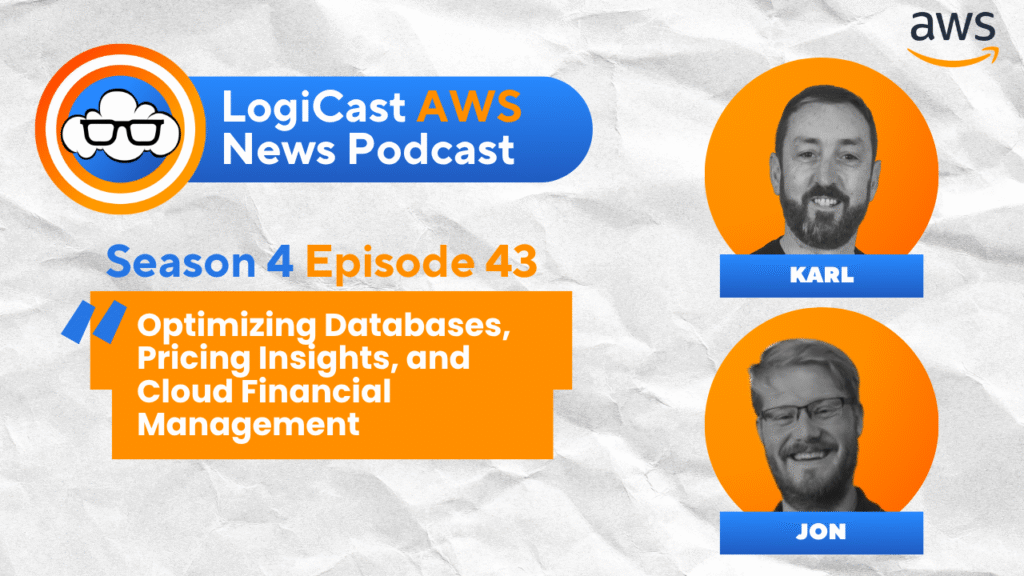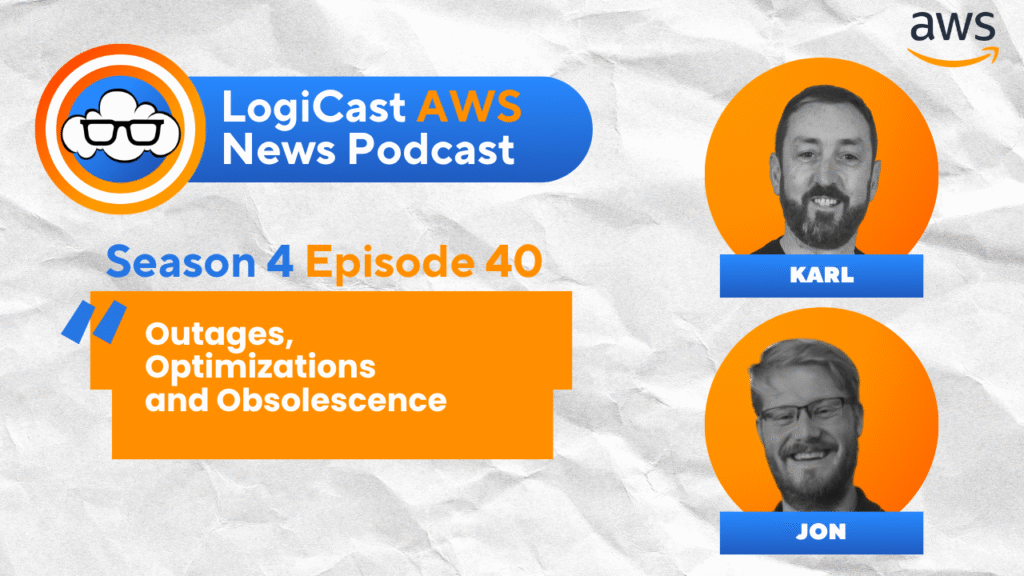
Logicata AI Bot
September 29, 2025
The Logicata AI Bot automatically transcribes our weekly LogiCast AWS News Podcasts and summarises them into informative blog posts using AWS Elemental MediaConvert, Amazon Transcribe and Amazon Bedrock, co-ordinated by AWS Step Functions.
In this week’s LogiCast AWS News podcast, host Karl Robinson and co-host Jon Goodall of Logicata welcomed guest Mahmoud Khatib, an AWS community builder based in Dubai. The trio discussed several recent AWS announcements and industry news, offering insights on how these developments might impact cloud operations and management.
EC2 Auto Scaling: Forced Cancellation of Instance Refreshes
Amazon EC2 Auto Scaling now supports forced cancellation of instance refreshes, a feature that Jon was particularly excited about. He explained that instance refreshes are used to update instances in an Auto Scaling group, typically when changes are made to the launch template or AMI.
Previously, if an engineer needed to cancel an instance refresh due to a bad update, they had to wait for any in-progress refreshes to complete. This could lead to additional instances with issues being deployed before the process could be stopped. With the new feature, engineers can now instantly cancel the refresh, potentially preventing further problems.
Jon emphasized the stress-reducing aspect of this feature for on-call engineers, stating, “You don’t have to wait for that anymore. So you can just go, uh, stop, and it’ll just stop dead, which is much, much better.”
Mahmoud suggested that this feature could be automated using Lambda functions to monitor and cancel refreshes that exceed a certain time threshold. Jon agreed, noting that this approach could bring EC2 Auto Scaling closer to the behavior of CodeDeploy with blue-green deployments.
RDS Cross-Region and Cross-Account Snapshot Copy
Amazon RDS has announced cross-region and cross-account snapshot copy, simplifying the process of moving database snapshots between regions and AWS accounts. While this capability existed before, it required multiple steps. The new feature combines these steps into a single operation, potentially saving hours of waiting time.
Jon explained that this feature is particularly useful for deploying to new regions or backfilling dev environments without the need for complex Database Migration Service (DMS) setups. He noted, “If you’re doing it for, you know, refreshing a different environment somewhere else or standing up a new environment from a copy of it, then yeah, I can see the utility.”
Mahmoud added that this update reduces complexity and cost associated with snapshot management, especially when dealing with Aurora databases that use cloud-native storage.
AWS Organizations Service Control Policies: Full IAM Language Support
AWS Organizations service control policies (SCPs) now support full IAM language, a development that Jon was particularly enthusiastic about. He explained that this update could potentially replace permissions boundaries within IAM roles, making it easier to manage permissions across multiple accounts.
Jon highlighted the benefits of using SCPs for access control at the organizational level, stating, “SEPs are very, very good because as Mahmoud says, you are controlling access at the edge, at the boundary. This is what can happen in this account at this level.”
The new features include support for action versus not action, resource versus not resource, and more flexible use of wildcards in policy statements. Jon believes this will simplify the management of permissions in complex multi-account environments.
Mahmoud, who recently became AWS security specialist certified, emphasized the importance of configuring security at the edge of the infrastructure. He noted that SCPs allow for blocking requests at the beginning of the IAM workflow, reducing complexity and configuration time.
CloudWatch Logs Centralization
AWS has introduced a simplified method for centralizing CloudWatch logs across multiple accounts. This feature builds upon the cross-account observability capabilities introduced about a year ago, allowing users to query logs across different accounts from a single view.
Jon explained that this new centralization method is particularly useful for organizations running multiple instances of single-tenant applications across different accounts. It simplifies log management and makes it easier to perform cross-account analysis using tools like OpenSearch, SIEM tools, or Athena queries.
Mahmoud noted that this update significantly reduces the complexity of log centralization compared to previous methods, which required configuring subscription filters for each source account.
Regarding costs, Jon suggested that while there is a potential for doubling up on log storage costs, strategic use of retention periods could mitigate this issue. He added, “There will be a slight cost implication, there will be a big implication if you get it wrong, but there’ll be a big cost implication if you get it wrong anyway. So I don’t think it’s a big risk.”
AWS Named Leader in Gartner Magic Quadrant for AI Code Assistance
AWS has been named a leader in the 2025 Gartner Magic Quadrant for AI code assistance. Jon, who has been critical of AI coding assistants in the past, shared his recent experiences with AWS’s Q Developer and Kiro tools at the CommSum conference.
After participating in workshops and competitions, Jon’s perspective on these tools has shifted dramatically. He was particularly impressed with Kiro’s ability to quickly generate complex frontend code, stating, “In about 15 minutes, Kero had done something that was 5 times better than what I could do. It’s like, I don’t need to learn front end, I’ll just get Kero to do it.”
However, Jon expressed some reservations about the Magic Quadrant itself, noting the absence of certain tools like Claude Code and the positioning of others like Cursor. He questioned the fairness of the rankings, suggesting that factors beyond pure capability might influence the results.
Conclusion
This episode of LogiCast AWS News highlighted several significant updates to AWS services, focusing on features that simplify management, improve security, and enhance developer productivity. From easier instance refresh cancellations to streamlined log centralization and advanced AI coding assistants, these updates demonstrate AWS’s ongoing commitment to improving its cloud offerings.
As the cloud landscape continues to evolve rapidly, staying informed about these developments is crucial for organizations looking to optimize their AWS environments and leverage the latest tools and capabilities.
This is an AI generated piece of content, based on the Logicast Podcast Season 4 Episode 37.





